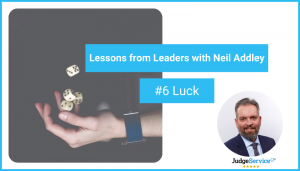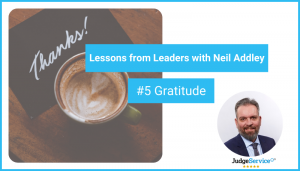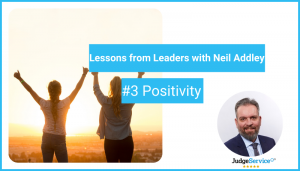One of the most important things in business is not to be afraid of failure.
Don’t be afraid to let others fail too.
There’s a beautiful phrase, “catching people in”. Most of the time when you are in a leadership/senior position you tend to spot when people have messed up – catching people out.
It’s far more powerful to "catch them in" and recognise their success. Whilst some people may be cynical, your boss telling you you’ve done a good job is still a great acknowledgement.
It encourages you to do more of what you are doing well.
Automotive legends like Tony Bramall and Sir Peter Vardy had the knack of the "hand of god".
“Our greatest glory is not in never falling but in rising every time we fall” – Confucius
Whether it is Thomas Edison and his team taking ten thousand attempts to make a lightbulb or Bill Gates whose first company was a complete failure before Microsoft. Stephen King had the manuscript for Carrie rejected so many times he threw it into the bin. Or the famous guy from Decca Records who told The Beatles that people didn’t like boy bands anymore…
Almost every person who is successful has failed at some point. As leaders, we should encourage people to try. We don’t want them to fail, but sometimes the best lessons you learn come from mistakes.
What mistakes have I learnt from?
In the past, JudgeService has launched new products and they’ve not been quite suited to the client. Does that mean the entire product is a failure… maybe so. But we can learn from that failure.
We have learnt that when we are talking to a new market then we have to learn the vocabulary of that market.
At the moment we are working with some law firms. Personally, I would have always called a legal action a “case” because that is what you hear on TV. But actually, legal action is referred to as a “matter”.
This means the products and services we develop need to suit “matters” not “cases”. The vocabulary needs to be 100% accurate.
Estate agents have branches, the automotive industry has dealerships, the hair and beauty industry have salons etc.
In the past we’ve hired people who haven’t done the job to the level we expected, this doesn’t mean we’ll never hire again. It just means we will be more careful and do further research into the hiring process going forward.
JudgeService is a simple product in many ways, we get data, we ask questions in a survey and we pass the results on. However, creating a quality product that works to the best of its ability for everyone requires colleagues to be engaged in the business.
We’ve learnt that it’s better to hire a relative novice who works within the business and learns from everyone around them than we are outsourcing to a relative expert because they won’t understand fully the way we work.
“Do not judge me by my success, judge me by how many times I fell down and got back up again” – Nelson Mandela.
The ability to be fully engaged with the business is definitely a challenge right now with people working from home.
I think that is one of the reasons why I don’t believe people when they say they are not going to have offices in the future. I think whilst it is possible for us to all work from home, we do better by working with other people.
That sense of sharing information and mistakes, learning from each other, is aided by the physical presence of other people. It cannot be fully replicated over Teams or Zoom.
Recently, one of my colleagues’ camera wasn’t working and the difference between making a video call rather than just a phone call was quite pronounced. I don’t know how the workforce would have coped throughout this pandemic without the help of video conferencing tools.
So how do we let our team know that it is okay to make mistakes?
Firstly, there shouldn’t be any form of shame associated with something going wrong or a genuine mistake.
This encourages people to share when they have made a mistake and learn from it. If you create a culture where people are afraid to make mistakes, then they won’t do anything. The only sure way to avoid failure is to do nothing, and that by default is failure anyway.
Next, avoid the ostrich syndrome, to bury your head in the sand.
You don’t want colleagues to feel like they need to bottle up, mask or hide their mistakes. You want them to address the problem and fix it.
A key idea for improving personal fulfilment and growth is to remember your “Circle of Influence”.
Many people focus on the things in life they cannot control. They blame their parents, teachers, the government, the system or their partner. This only leads to disappointment; you must focus on only the things that you can control and influence those things to make your life better and therefore yourself happier.
The more you focus on your circle of influence the stronger and wider it becomes.
Finally, I don’t believe that failure is black or white.
Most of the time we are on a spectrum where even though we may have failed, we can see the positives we can learn from going forward.
In doing so, that failure may turn out to be your first step in the right direction towards success. Without that failure, you would have never learnt the things you needed to in order for you to succeed.
“My grandmother once told me, don’t let failure get to your heart, and don’t let success get to your head” - Will Smith
Let me know in the comments what failures you've encountered which have turned out to be successes in the end!
Did you enjoy this blog post? Check out the rest of the series on the JudgeService blog - or browse some below.







